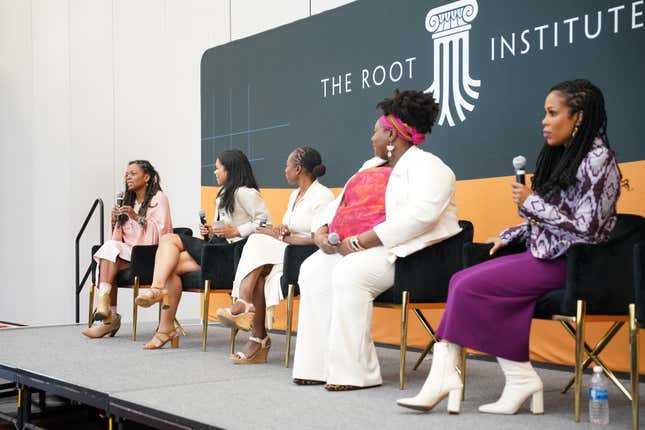
This year, the Black maternal health crisis took center stage at The Root Institute. We sat down with some of the leading experts in this field — including Dr. Joia Crear-Perry, Dr. Myechia Minter-Jordan, Dr. Uché Blackstock, and Oriaku Njoku to tackle one of the greatest threats to Black pregnant people, the state of our health care system.
Black women are roughly three times as likely to die from pregnancy-related causes as white women. And despite more attention on this issue, the statistics are only getting worse.
Throughout our conversation, we delved into the ways we can create a nation where Black pregnant people no longer have to live in fear.
1. We Need More Black Doctors
One way to address the Black maternal health crisis is by connecting Black patients with Black doctors. Studies have repeatedly shown that Black patients have better outcomes when treated by Black doctors. And research looking at Black infant mortality has found that Black infants are significantly more likely to survive if the physician is Black.
However, only 5.7% of physicians in the United States identify as Black, according to February data from the Association of American Medical Colleges. Working to increase the number of Black doctors in this country and ensure that they’re able to serve in Black communities is a key aspect of tackling this crisis.
2. Health Insurance Need To Be More Accessible
Dr. Uché Blackstock argued that one of the best ways to ensure Black pregnant people are safe is moving towards universal health care. Blackstock pointed to the fact that other nations with universal health coverage have significantly better birth outcomes.
Short of moving towards a universal system, expanding Medicaid coverage would have massive benefits for Black pregnant. Prior to joining our panel, Dr. Myechia Minter-Jordan, CEO of the CareQuest Institute for Oral Health, wrote an op-ed for The Root explaining the necessity of Medicaid expansions:
Going forward, all states should extend postpartum coverage from 60 days to at least 12 months and should make this a permanent benefit. This would reduce lapses in insurance coverage, improve health equity, and reduce racial and ethnic disparities in birth outcomes. Each state should also provide extensive Medicaid dental benefits to all adults, and Congress should make this a permanent part of the Medicaid program and establish a baseline of covered services for all states.
3. We Need to Tackle Racial Bias
Although economic inequality plays into the Black maternal health crisis. Everyone agreed that racial bias was the central part of the problem.
Black women with a college degree or more die at over five times the rate of white women with the same educational background. And Black women with a college degree are 1.6 times more likely to die from pregnancy-related causes than white women without a high school education, according to the Kaiser Family Foundation.
Pervasive myths, such as the ludicrous theory that Black people feel less pain, continue to plague the healthcare system.
Until we tackle racism within the health care system, argued the panelists, we can’t fully deal with this crisis.
4. Doulas Save Black Lives
Doulas are another important part of this puzzle. Doulas, birth professionals who advocate for their pregnant patients, have been shown to increase birth outcomes.
5. We Have to Take a Holistic Approach to The Black Maternal Health Crisis
One major takeaway from this panel was that we can’t tackle this crisis without looking at the broad spectrum of reproductive justice and the larger healthcare system.
Dr. Myechia Minter-Jordan stressed the importance of Black pregnant people having access to oral health care. Poor oral health care has been linked to a ton of adverse birth outcomes, including preeclampsia, preterm birth, and low birth weight deliveries.
And Dr. Joia Crear-Perry and Oriaku Njoku masterfully connected the larger fight for reproductive justice to the Black maternal health crisis, arguing that we can’t tackle issues like Black maternal health, white supremacy, and abortion in silos.
Honorary Mention: The Black Momnibus
Throughout our panel, Dr. Crear-Perry and others repeatedly pointed to Congress passing the Black Momnibus, a comprehensive legislative package, which includes many of the solutions (and then some) that we discussed during our panel!


